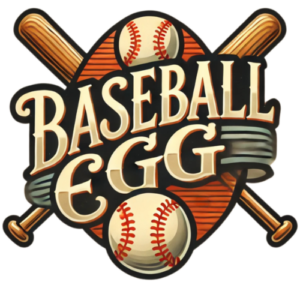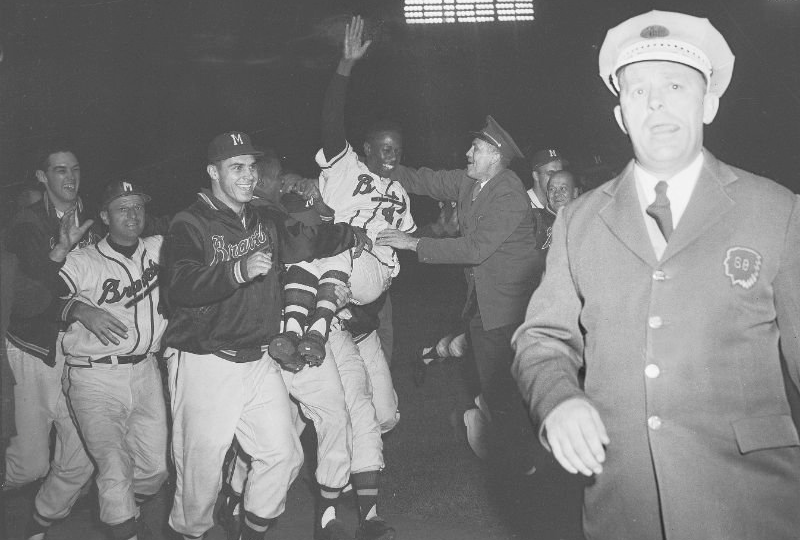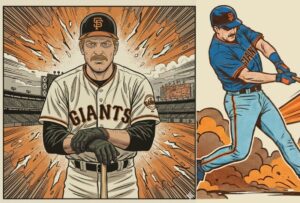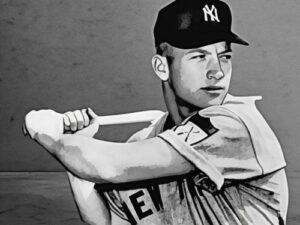It’s been estimated that every one of the 650,000 or so people who lived in Milwaukee was listening to the game. It’s certain that five percent of the population (just about 40,000), were in County Stadium to witness the game. For those who were there, or for those who were listening to it on the radio, they witnessed a great baseball moment.
There have been seven pennant-winning walkoff home runs in baseball history. In all the years that baseball ahs been around, it’s only happened seven times. I bet many of you can name a few of them. There’s the most recent one: Jose Altuve off Aroldis Chapman in 2019. Then there’s that homer hit by Travis Ishikawa in the 2014 NL Championship Series for the Giants. Speaking of Giants, many of you might remember “The Shot Heard ‘Round The World,” which was launched by the bat of Bobby Thomson in 1951. That one sunk the Dodgers and put the Giants into the World Series.
In 1976, Chris Chambliss lofted a high fly ball into the right field stands at old Yankee Stadium to send the Yankees to the Fall Classic. Chambliss had to navigate his way through a sea of fans who impeded his path around the bases. And as long as we’re talking Yankees, there was the homer hit by Aaron Boone to win the 2003 pennant. That one also happened in old Yankee Stadium, though it was hit to left field.
In 2006, Magglio Ordonez smacked a rocket-like home run into the left field stands at Comerica Park off Huston Street of the A’s. The blast gave the Tigers their first pennant in 22 seasons.
Let’s see: that’s 1-2-3-4-5-6 of the pennant-winning walkoff homers. The other is somehow less remembered. But it was just as thrilling to those who experienced it, and it came off the bat of the greatest home run hitter in baseball history.
Maybe the 1957 pennant-winning homer is largely forgotten because it happened in the regular season. Maybe it’s less remembered because it happened in Milwaukee, fly-over country. Maybe it’s because the game, unlike the rest mentioned above, was not nationally televised. But the moment remains one of the most special, and perhaps the most special in the history of Milwaukee baseball.
The 1957 National League Pennant Race
The experts at The Sporting News predicted the 1957 NL pennant race would come down to the Brooklyn Dodgers and the St. Louis Cardinals, with possibly the Phillies in the mix. The Braves were picked to finish somewhere in the middle of the pack. This was pretty disrespectful, considering the Braves had finished second to the Dodgers in both 1955 and 1956. But being unappreciated is part of life in Wisconsin.
The Dodgers, winners of four of the previous five NL flags, suffered numerous injuries to their pitching staff, as well as inconsistent performances by their staff. The Cardinals made a race of it, in fact the Redbirds were in first place in mid-July, stretching their lead over the Braves to as many as three games.
In August the Braves put together a 10-game winning streak and pulled ahead. But after losing to the Phillies on September 15, the Braves were only 2 1/2 games in front of the Cardinals, and the Dodgers had inched to within six games.
On September 23, the Cardinals came to Milwaukee to start a three-game series against the Braves. There were six games left on the schedule, so for the Cardinals, who were five games back, they really needed a sweep.
The night Henry Aaron won the pennant
The excitement in Milwaukee the day of the game was palpable. Milwaukee was a close-knit town, a place where the butcher and the mailman knew your family by their first name. Eddie Mathews once explained that he could have played in New York and been a superstar, but in Milwaukee he was royalty.
The Braves were in just their fifth season in Milwaukee, but their talented roster, led by All-Star outfielder Hank Aaron and others, was poised to knock the Brooklyn Dodgers from the top of the National League.
Lew Burdette was on the hill for Fred Haney’s team, and St. Louis started Vinegar Bend Mizell. In the sixth, trailing by one, Alvin Dark had a two-run single to give the Cardinals the lead. The Braves pushed across a run in the seventh to tie the game, to the delight of the neatly 41,000 fans at County Stadium.
The game remained tied and advanced to extra innings. Burdette pitched a 1-2-3 tenth, but the Braves threatened in their half, putting two on with one out. But Frank Torre (Joe’s older brother) grounded into an inning-ending double play. Reliever Gene Conley (who was also a professional basketball player) pitched the top of the 11th for Milwaukee, holding the Cardinals scoreless.
In the bottom of the 11th, Aaron came to the plate with two outs and teammate Johnny Logan on first base. The pitcher was Billy Muffet, a rookie reliever in only his 23rd MLB game. Muffett, who later had a long career as a coach in the big leagues, recalled what happened.
“Everybody in the league knew [Aaron] was a fastball hitter,” Muffett said. “I threw a pair of breaking balls, and then he fouled off my changeup. The first fastball I threw was 2-1, and it was in on him. But he was ready and it was over. It was actually a good pitch.”
Aaron hit a fly ball high into left field where it landed about two rows into the stands. Logan scored the winning run, and “Bad Henry” came behind him to finish the game. The Braves were champions of the National League. The photo of Aaron being carried off the field by his teammates, with ballpark officials and fans engulfing him, is one of the most iconic images in Milwaukee sports history.
The home run was the 43rd of the season for Aaron. It was the first of his eight 40+ HR seasons. A few weeks later, he and the Milwaukee Braves would win the World Series, upsetting the heavily-favored Yankees. It was the only time Aaron and Mickey Mantle competed on the same field outside of the All-Star Game. A few weeks later, Aaron was named Most Valuable Player of the National League. Amazingly, it would be the only time “Hamerrin’ Hank” would win that honor.
But awards were secondary to Aaron, whose professional career began in the negro leagues.
“That was the biggest hit of my career,” Aaron said decades later. “I didn’t know it would be, I thought I’d have many more, but that was the most important because of what it did for the team.”






